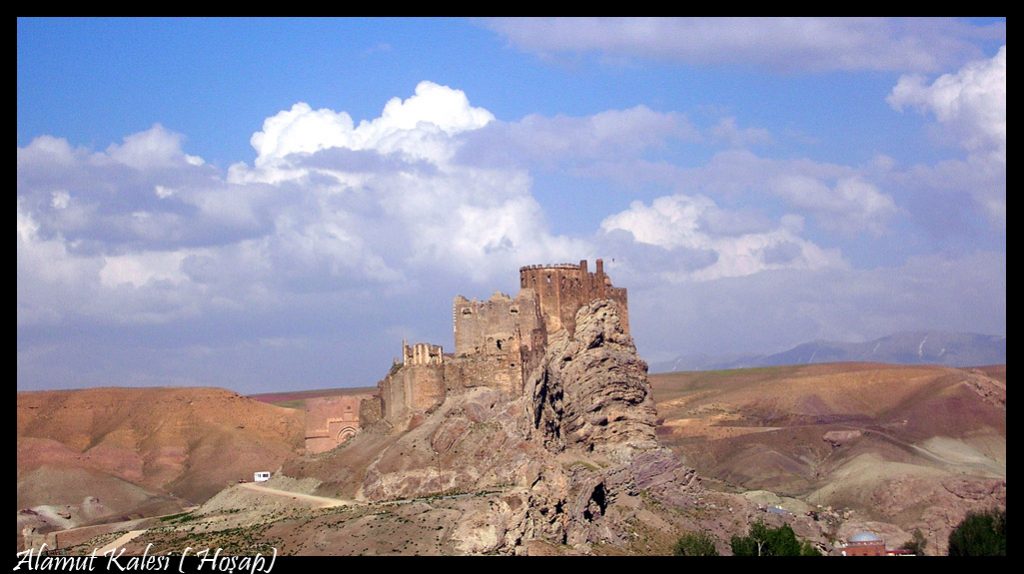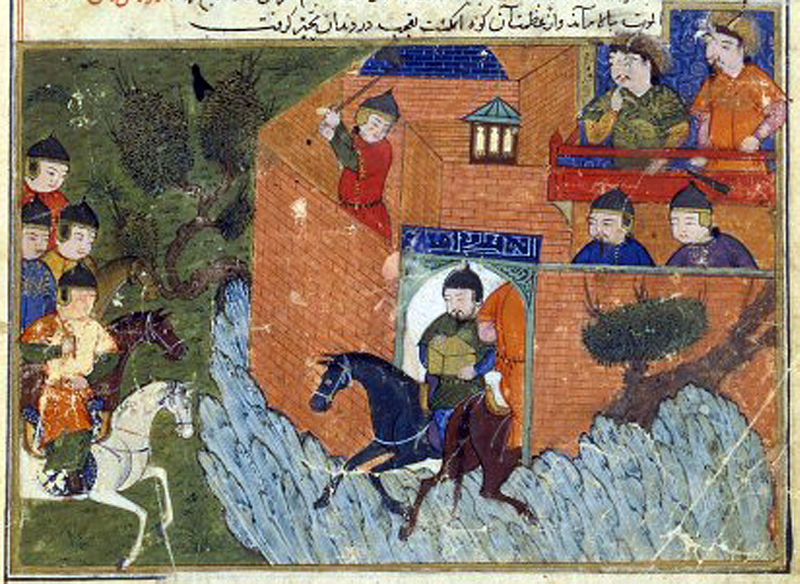What would this site be if our first real post wasn’t about a fort? In some ways, we are setting the bar high for future forts to come, but you should eat your dessert first because life is uncertain.

That right there is the ruins of Alamut, a fort perched on the edge of a cliff. The fort’s story begins rather righteously: Wahsudan b. Marzuban was out for a little hunting in the mountains, and saw an eagle land on a rock atop this cliff, and thought to himself “eagles are known experts in strategic fort placement, I’m not letting this opportunity slip by”. So he builds the beginnings of Alamut, referring to his fort as the “Nest of Punishment” — which is perfectly sane and indicative of his positive outlook on life.

Okay, you’re thinking “some dude’s BDSM palace is for the birds, what do I care?” Well, that’s where 200 years later takes us, to the guy who really made this fort something special, Hassan-i-Sabbah. One of the stories goes that Hassan acquired the place by telling its then-owner Mehdi that he was ready to retire and wanted to buy some land around the fort for 5000 pieces of gold. How much land? Only as much as an oxhide will cover.
Taking Hassan for a crazy person, who didn’t have that much gold to begin with, Mehdi accepts the deal. Hassan throws him a bag of the gold and sets off to go skin an ox, probably with his own teeth. Once he has a nice oxhide, Hassan then takes out a fine knife and begins cutting the hide into thin, zig-zaging strips. Once that tedious business is over, he gingerly walks around the entire cliff and mountain-top-fortress encircling it with his cowhide string. Mehdi apparently decided not to dispute whether their contract was executed in good-faith and accepts the fortress now belonging to Hassan, and the historical veracity & logical soundness of this story is undoubtedly true & strong.
Once the fort is under Hassan’s control he goes all eco-hippie on it and builds another complex with a massive garden to offset his CO2 emissions and feed his growing army. See, Hassan had a vision for what a fort could be. Rather than just a small place to protect oneself from nearby intruders, Hassan wanted his fort to be spiritual and tactical home to the Ishmaelian sect of Islam.
Quoting the esteemed historian Robert Anton Wilson:
Ishmaelian religion had already at that date become a nine-level affair in the manner typical of mystical secret societies. Those of the lowest grade, for instance, were merely informed that Al Koran contained an allegorical meaning in addition to its surface teachings, and that their salvation lay in following orders. As a neophyte progressed through the various grades, more and more of the allegories would be explained, and a doctrine would gradually emerge which is, in essence, that taught by all the mystics of East and West—Buddhists, Taoists, Vedantists, Rosicrucians, etc. The doctrine is, in important aspects, unspeakable (which is why the trainee required an imam — the Ishmaelian equivalent of a guru— to guide him in the nonverbal aspects) ; the ninth and highest grade, however, had no parallel except in very strict Theravada Buddhism. In this ninth grade, which Hassan attained shortly before founding the Hashishim, it was taught that even the personal mystical experience of the seeker (his own encounter with the Absolute, or the Void, or the Hodge-Podge, or God, or Goddess, or whatever one chooses to call it) should be subject to the most merciless analysis and criticism, and that there is no guide superior to reason. The Ishmaelian adept, in short, was one who had achieved supreme mystical awareness but refused to make even that into an idol; he was a total atheist-anarchist subject to no authority but his own independent mind.
“Such men are dangerous,” as Caesar observed, and certainly they are dangerous to the Caesars; the Ishmaelians were being persecuted throughout the Moslem world, and strong efforts were being made to exterminate them entirely when Hassan i Sabbah became Imam of the whole movement.
It was Hassan’s cynical judgment (and many Illuminated beings, such as the Lamas of Tibet, have agreed with him) that most people have no aspiration or capacity for much spiritual and intellectual independence. He thereupon reorganized the Ishmaelians in such a way as to allow and encourage those of small mind to remain in the lower grades.
The tools of this enterprise were the famous “Garden of Delights” in his castle at Alamout (a good duplication of the Paradise of Al Koran, complete with the beautiful and willing houris the Prophet had promised to the faithful)— and a certain “magick chemical.” Those of the lowest grade were brought to Alamout, given the miraculous concoction, and set loose for several hours in the Garden of Delights. They came out convinced that they had truly visited heaven and that Hassan i Sabbah was the most powerful Holy Man in the world. They were assured, furthermore, that if they obeyed every order, even at the cost of their own lives, they would return to that Paradise after death.APPENDIX DALETH: HASSAN i SABBAH AND ALAMOUT BLACK
These men became the first “sleeper agents” in the history of international politics.

Now Hassan has his army of sleeper agents, who are rightly convinced by physical evidence that he has the key’s to paradise, and turns loose on just about everyone in Middle-East and into the Mediterranean Europe that he disagrees with. In short order, Hassan and his Hashshashin steer most of the great powers in this region to his will, all without controlling any real territory, launching any invasions, or sacking a city.
Quoting now from Adam Weishaupt:
Surrounded by Moslem maniacs on one side and Christian maniacs on the other, the wise Lord Hassan preserved his people and his cult by bringing the art of assassination to esthetic perfection. With just a few daggers strategically placed in exactly the right throats, he found Wisdom’s alternative to war, and preserved the peoples by killing their leaders. Truly, his was a most exemplary life of grandmotherly kindness.
Uber Strip Schnipp-Schnapp, Weltspielen and Funfwissenschaft
It grew to a point where he didn’t even need to always kill his targets, but just leave a dagger on the pillow-side. Something like Lyndon Johnson leaving a Carcano Model 91/38 in Marilyn Monroe’s dressing room. After all, why not have known enemies become compliant personalities, versus having to figure out the motivations of their hypothetical unknown successors?

So what’s the lesson for forts here? Chiefly, Hassan shows us that their power extends far beyond their walls — you don’t need to control an empire to get things done. You can acquire or create a fort by creative means — just cut up an ox or follow the eagles. And lastly, if you build them right, your shit will still get wrecked by the Mongols — all things are temporary, friends.



